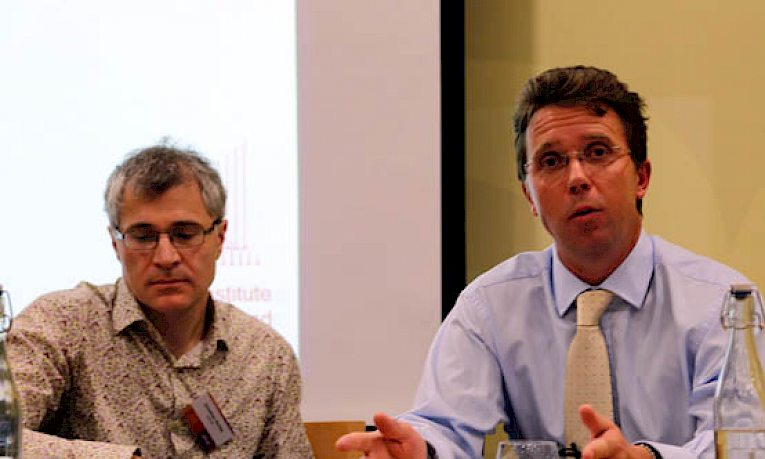At the first evening meeting of the new year on Tuesday 14 January, Michael Saunders of Citigroup and Jonathan Portes of NIESR went head to head over the prospects for the UK economy.

Mr Saunders was the more optimistic of the two, forecasting above 3% economic growth this year (with upside risks) and questioning why some economists forecasting a slowdown were “conditioned for disappointment”. The basis for his view included lower inflation, strong corporate liquidity (supportive of a rebound in business investment), substantial deleveraging in the household sector already having taken place, and optimism about the housing market given that the prime house-buying demographic is set grow rapidly going forward. Despite an improving outlook, however, he pointed out that the gains from recovery to date had been uneven across income groups.
The Bank of England’s unemployment threshold was more likely to be met in two quarters rather than two years, according to Mr Saunders, at which point he expects the Bank to ‘do a Fed’ - i.e. rather than revise down the threshold towards (or maybe through) the Bank’s view of the medium-term NAIRU (6.5%), for the Bank to say that unemployment would probably have to fall well through the existing threshold before policy tightening is invoked. The need to manage the exit from ultra-loose policy will be crucial for the MPC going forward; the Bank will have to be careful not to break the recovery on the one hand, but equally not to allow inflation pressures to build on the other.
Mr Portes began his discussion with a look at how we got to where we are, in particular contrasting the prescription of Keynes (that a boom, not a bust, is the right time to tighten fiscal policy) with the Treasury’s ‘Plan A’. He pointed to the fact that UK 10 year government bond yields had tracked those of the US well despite claims that the markets had been particularly concerned about the UK. Allowing the deficit to remain high during periods of sizable spare capacity is Mr Portes’ mantra, though he was encouraged by the fact that the government has watered down its tightening plans. In fact he pointed out one reason the economy was now recovering was due to the fiscal tightening becoming less sizable.
A number of key economic challenges facing the economy remain. The first was the UK’s productivity puzzle, which it was argued by Mr Portes was not likely to be permanent - his view was far from the message of Robert Gordon, instead arguing that there is little evidence to support the notion that innovation growth has slowed. On monetary policy, he agreed that the unemployment rate would likely fall to the BoE’s forward guidance threshold very soon - possibly even more quickly than Mr Saunders thought. The Governor, it was argued, was more likely to take risks with inflation than the recovery when setting policy.
One of the biggest policy dilemmas was likely to involve the housing market, according to Mr Portes. Pricking a London bubble via interest rates was not the right policy; rather, macro-prudential operations are the right approach, though may be hard to square with existing government schemes (Help to Buy) designed to support the market.
In summary, it was a lively debate covering an array of topics from monetary and fiscal policy to the recovery, the housing market, and economic rebalancing. Despite Mr Saunders’ more optimistic view on growth there was much agreement between the two on the outlook.
With many thanks to Ashurst once more for hosting the event.


